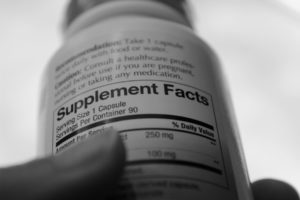 False.
False.
MANY PEOPLE BELIEVE that taking vitamins and minerals will result in an immediate energy boost that can help wake them up, improve exercise performance, or get them through the last hours of a hectic day at work. I have disappointing news: ere really is no scientific evidence to support this belief.
Like other misconceptions, vitamin-boost claims are common on the Internet. While preparing for this chapter, I came across this statement: “Not only do they [vitamins] offer a host of health benefits, certain vitamins can also help pick you up out of a slump you may feel due to expended energy.”
This simply isn’t true!
One reason for this myth’s widespread belief could relate to the large doses of vitamins (especially B-complex vitamins) that often are ingredients in energy drinks. Adding B vitamins such as B6, B12, folic acid, thiamine and niacin as well as vitamins A and C may incorrectly imply that energy drinks are healthier and more nutritious than is the case.
The addition of vitamins also can imply that vitamins are responsible for boosting energy levels.
In reality, if you choose to consume energy drinks, any energy boost likely comes from the sugar (often 20 teaspoons or more) and caffeine (a known stimulant) found in these drinks rather from any vitamins they may contain.
Vitamins are important in helping your body convert the food you eat into energy that your body can use. However, that process is complex and takes hours, not minutes. Converting food to cellular energy is complex. If you have ever taken a biology or physiology class, you’ve probably had to memorize the Krebs Cycle, also known as the Citric Acid Cycle.
If you’ve not had the pleasure of memorizing the Krebs Cycle and regurgitating it on an exam, I encourage you to Google it and experience it firsthand.
In an article published in Athletic Therapy Today (2006), Kathleen Laquale writes, “In general, of the six basic nutrients—carbohydrates, fats, proteins, water, minerals, and vitamins—only carbohydrates, fats, and protein are energy sources. They supply potential energy to power muscle contractions and cellular functions, both critically important to the physically active.” She continues, “In addition, high intakes of vitamin supplements could cause physiological imbalances, especially when an athlete’s energy intake is low.”
So vitamins and minerals are not a source of immediate energy, and taking large doses of them could actually cause health problems.
I have found research that suggests taking vitamin and mineral supplements over the course of a month can improve overall alertness, ability to concentrate, and mental and physical stamina. However, these studies didn’t consider energy levels immediately after taking supplements.
Also consider that many nutritional experts say if we eat a well-rounded, balanced diet, we likely get all the vitamins and minerals we need to be healthy. If that is the case, then taking additional vitamins and minerals probably will have little or no positive impact on our health.
I’ve previously shared that my wife and I took a multivitamin-plus-mineral supplement daily for many years (we no longer do), and I can honestly say that I never, over all those years, noticed even a slight increase in energy after taking them.
Laquale, K. B-complex vitamin’s role in energy release. Athletic Therapy Today (2006), Vol 11, pp. 70-73.
